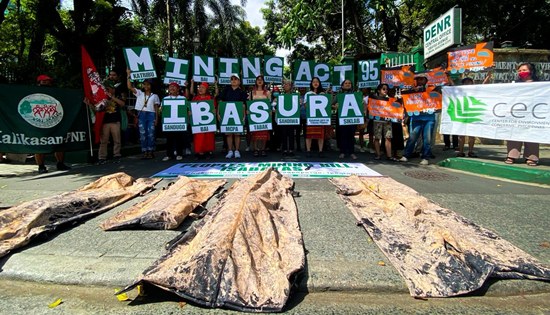29 years later,
Philippine Mining Act calls to be scrapped

By
KATRIBU
March 4, 2024
QUEZON CITY Ė
Indigenous and Moro Peoples' groups, along with environmental and
human rights defenders, trooped to the Department of Environment and
Natural Resources (DENR) on Monday, a day following the anniversary
of the implementation of the Philippine Mining Act of 1995 (Republic
Act No. 7942). The groups demanded the scrapping of the law,
decrying its 29 years of promoting destructive large-scale and
open-pit mining operations on Philippine soil and coastal seas.
Enacted during the
administration of former President Ramos, the mining law liberalized
the Philippine mining industry to bolster the country's economic
growth. However, nearly three decades later, mountains have been
flattened, rivers have become lifeless, and the well-being of the
people has been severely affected.
Critics of the law,
including Indigenous Peoples and environmental activists, stress
that the mining act has not yielded any positive progress for the
country and its people, but has rather facilitated the surrender of
national patrimony to avaricious foreign corporations. While RA 7942
does not guarantee 100% foreign ownership of mining companies, it
does grant leases of the country's lands to foreign corporations for
25 years, renewable for an additional 25 years thereafter.
Communities most afflicted
by mining companies are often those of Indigenous and Moro Peoples,
where lands have been protected and enriched for centuries. Mining
projects persist in encroaching upon ancestral lands and
territories, facilitated by the National Commission on Indigenous
Peoples (NCIP) through fraudulent and manipulated free, prior, and
informed consent (FPIC). This is often accompanied by the
militarization of communities, commonly supported by the National
Task Force to End Local Communist Armed Conflict (NTF-ELCAC) and
state security forces. Consequently, these actions have led to
widespread land-grabbing in Indigenous and Moro Peoples'
territories, causing significant loss of livelihoods and
displacement.
Over the years,
environmental disasters and tragedies have plagued communities
living around mining sites. In the Cordilleras, the Benguet, Lepanto,
and Philex mining corporations have wreaked havoc on the lives and
surroundings of the Igorot people. Most recently, the landslide
incident involving APEX mining in Maco, Davao de Oro, claimed nearly
a hundred lives.
The Philippine Mining Act
of 1995 is anti-people and anti-environment. Its continued
existence, along with the push for Charter Change (ChaCha) under the
Marcos Jr. administration, will only lead to further disasters for
the people and the environment. Therefore, it is imperative to call
for the repeal of the law and the enactment of pro-people and
pro-environment policies, such as the People's Mining Bill, among
others.